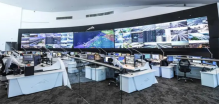"Our goal is to radically improve global mobility," said Uber Aviation product chief Nikhil Goel. He said the all-electric flyer can achieve speeds of over 300 kilometers (200 miles) an hour with a range of 100 kilometers (60 miles) on a battery charge. "We fly a lot so we can prove to the FAA (Federal Aviation Administration) and the public that these aircrafts are safe," he added.
Uber has become a global force in transportation with its ridesharing service, but is also working on autonomous vehicles and other forms of transport.
The ride-sharing company plans the first demonstration flights for Los Angeles in 2020 and commercialization of the flying taxis in 2023, saying these could be ordered on demand just like a ride-sharing vehicle.
Eric Allison, who heads Uber's Aviation programs, said the flying vehicles are part of an overall strategy allowing people to do without personal cars. "The rational choice for transportation will be less and less to own and drive a car," Allison said. "We want to price it so low, it'll be irrational to drive your car."
The first flying taxis will be designed with a pilot, according to Allision, but over time can be developed as autonomous vehicles.
As for the challenges that come with such an innovation, Uber operations director Jeff Holen says the obstacles to the new transport mode are mostly around regulations of air space, adding, "The technology exists... we can solve this today."


















